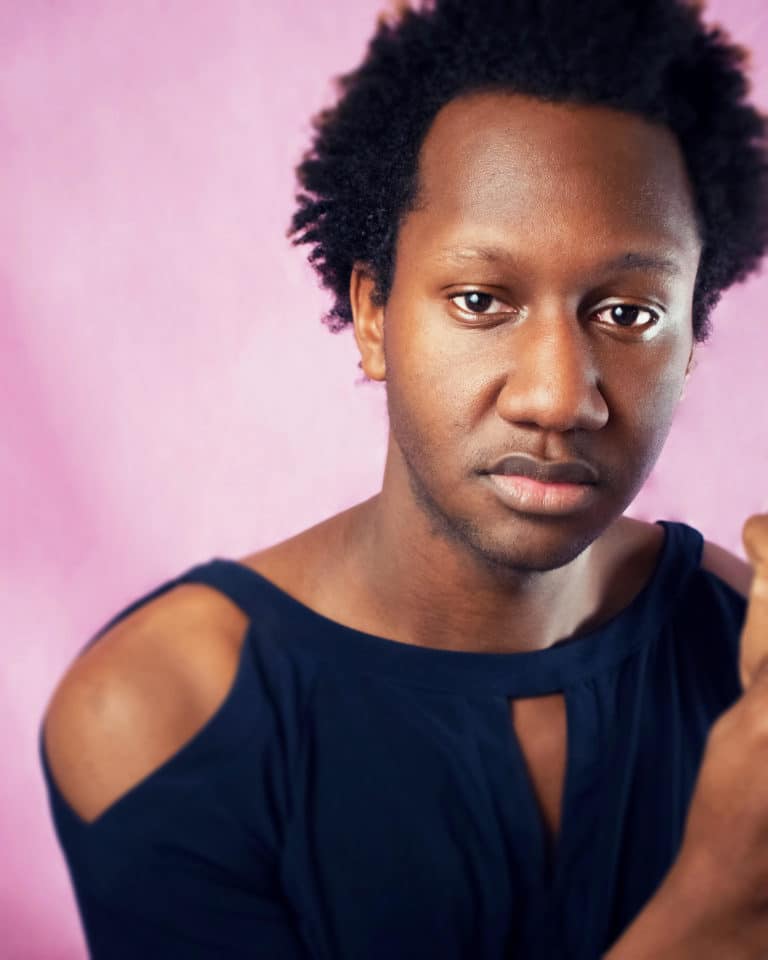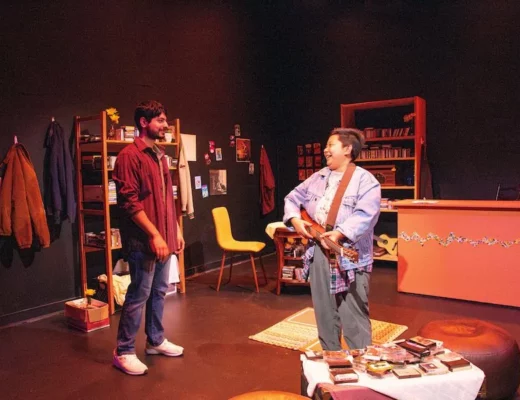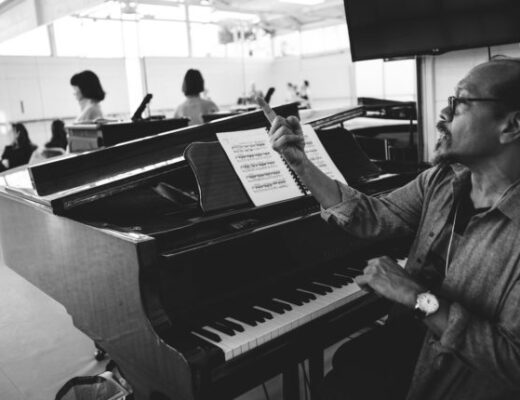By Daniella Ignacio
This article was first published February 25, 2020 in DC Theatre Scene here.
Head Over Heels made a splash on Broadway in 2016, notably starring the first transgender actor playing an out nonbinary character in a Broadway musical — Peppermint as Phythio. Now, the DMV is about to experience a whole new “Beat,” as Monumental Theatre Company produces the first regional production of this musical, which is based on The Countess of Pembroke’s Arcadia. It’s about people fighting to save their kingdom from extinction and going on a quest for self-discovery and love – all while singing the lively music of the Go-Go’s.
I got the chance to talk with Monumental’s artistic director Jimmy Mavrikes (directing his first big musical for Monumental), managing director Beth Amann and actor Topher Williams (who plays Phythio) to discuss how Head Over Heels examines gender and sexuality.
Why did you want to produce Head Over Heels at this particular moment in time?
JIMMY MAVRIKES (he/him/his): I saw it on Broadway closing weekend, and I didn’t want to see it, I hadn’t really heard much about it, but my friend was like “we’re going, we have to see it, it’ll be like my third time seeing it, I absolutely adore it, and I think it would be up your alley.” And she was right. I was immediately drawn in by the script, and as the story went on, I loved the inclusiveness, the body positivity, the feminism, just everything that it was. And it was such a fun musical, and I fell in love with it, and obviously I knew it was closing weekend so I figured rights would be opening up soon. So I reached out to the rights company and we are the lucky ones who get to be the first ones to do it in the DMV.BETH AMANN (she/her/hers): It’s definitely a show that celebrates the myriad types of people that there are, relationships you can have and gender expressions. Especially in this political climate where sometimes it feels that those things are being threatened, the best thing we could do is throw our support behind everyone getting to be exactly who they are and who they want to be. It’s also just a bopping show and it fits really in line with the types of shows that we produce. It’s a mission we believe in — getting to put diverse people onstage and show off all their talents is very important to us.
TOPHER WILLIAMS (she/her/hers): It’s FUN. It’s music, that if you don’t know it yourself, you kind of know it on the periphery, and it has this sort of infectiousness, and it’s a really, really fun way to come back and start doing what I want to do again, which is storytelling. If you find me at a party, I’m the person telling you an anecdote about one time a year ago, or this one time that I got to watch my best friend fall over laughing. I love stories, I love the way you get to pass them on and watch someone’s face as the twists and turns are happening.
BETH: And theatre is storytelling. And it’s a two-way conversation. So getting to share this type of stuff with our audience and see them absorb it, understand it and then perhaps go have a conversation they might not have had otherwise, is really exciting.
What’s the importance of young artists telling this story?
JIMMY: We work with mostly young professional artists and I feel as though we’re the generation who are really fighting for this inclusiveness in the world, as well as in the theatre, and so there’s just a real passion behind the work we do in all aspects — not just in the theatre, but in the good work that we should be doing in this climate that we have today.
BETH: Young people are the ones pushing this into the forefront of conversations at your family holiday, at parties with friends. It’s not important that we’re the only ones telling it; it’s important that we see our responsibility to take up the charge to do it. I think for me, Jimmy and Michael [Windsor, co-artistic director] as producers, we recognize that there’s stories that should be told, that we cannot tell as white people and cisgender people. So giving an opportunity for those who have had a different experience than us to tell the story is incredibly important to us. We’re just giving them the stage.
TOPHER: For young people, a lot of times there’s this idea that maybe you haven’t gotten there yet, and sometimes you put a lot of pressure on yourself like, “I’m not all together yet.” The truth is everybody has an inner life, right? Everybody has a story, and a narrative, and a force that they’ve been walking through, and they’ve picked fruit, and they’ve seen flowers, and allowing them to talk about that can be so informative in a lot of different ways. When it comes to a lot of industries, there’s this idea that you can only do it if you have a certain pedigree or hegemony. Allowing younger people to do it, especially in the climate that we are in…a lot of us have an understanding of kindness. Saying, “okay, I got to talk, but what do you have to say? And what do you have to say? And what do you have to say?” Making space for everybody in a way that is so desperately needed.
Topher, how does it feel to have the responsibility of being the first person to play Phythio in this regional premiere?
TOPHER: I think that it’s important to set a standard. A standard of what this person should look like, who this person should be and a sort of understanding of what that life and body of work is. Because there are certain roles where it’s like, you’ve never been a green witch, but you can pretend, because anyone can pretend. You can pretend to be a lawyer, you can do research, you can kind of shift it. But not everyone is in certain positions where they know certain life stories intimately, particularly when you talk about groups of people who have traditionally not been allowed to speak up for themselves: not been given a voice, not been given a time and a platform. I’m grateful that it was a choice that was thought out and properly made, because I’m grateful it was me (because ya girl likes to work), but also, even if it wasn’t me, I trust in the people that are in charge here that they would make that right choice. Because when you tote yourself as having a role that’s supposed to be outright queer or positive or these very specific things, and then you cast it in a way that it’s not that, especially the way that people like to play act in “tradition,” it’s blatantly disrespectful in a way that’s saying “you don’t exist,” or “this is what we prefer to see.” And it’s a good thing that’s not what happened here.
What’s the importance of LGBTQIA+ artists telling stories about your own identities?
TOPHER: So, history is important, right? If it’s not your history, it’s probably not your story to tell. And there’s places in which those lines get kind of gray. But I’m a black person. I can read poetry from Korea. I have very intimate relationships with people from Korea. There is nothing I can ever do that gives me the right to try and tell a story about and for Korean people, because that’s not my history. I can learn about it, I can love it, I can respect it, I can support it, I can give it a platform, but I cannot take that in my hands and say “look at my shiny baby,” because it is not mine. And particularly in this industry where it’s hard enough to tell your own stories and they certainly won’t let you tell anyone else’s, the ones that are supposed to be so universal and that everybody kind of gets to hop on, it’s so important to give people with specific histories the chance to revel in it and stand in it and be proud of it.
During the casting process, did Monumental make any effort to reach out to LGBTQIA+ artists specifically or did they naturally come to you?
JIMMY: I knew when I saw this show and when I wanted to do it, that I wanted Topher to play this role, because I knew that she’d be a great person like Peppermint was on Broadway. So she was a precast. We knew that if I was doing this show, that I wanted to do it with her. And we lucked out, and she wanted to do it with us, as well, so that was really welcoming. Otherwise, we had so many people come out to our open call of all facets of the LGBTQ+ community and we were just really lucky that we had so many to choose from and we got really cool people who might have reached out and said “I’m interested in this piece because of this,” and we took an extra look at those people.
ell us about the rehearsal space and how you’re creating a supportive environment for everybody.
JIMMY: Day one: as soon as we introduced everybody, everybody used the pronouns that they wanted to use in the space. We had a handout on how to use gender in the space so we were all on the same page with how we were going to handle it. And honesty, it’s like second nature, and it’s really beautiful. I’m really proud of the space that we’ve created. Just thinking about some of the things that some other theaters might not even think about, like dressing room assignments and stuff like that. Or vocal parts in an ensemble, shoe sizes, you know. We’re taking the time to make sure that everybody is comfortable. The world is so binary and we have to deconstruct that. We may be making some mistakes, but I think it’s super important that we learn and we grow and hopefully people who come to see our show will ask us questions to break down the binary and create a more inclusive environment in the theater and elsewhere.
Has it made for a better experience?
TOPHER: Yes. Because here’s the thing. So often in our society at large, particularly in workspaces, there’s a lot of division of who’s capable of what, and who can do P, Q and X. It makes a difference when someone asks you what you like. It makes a difference when you can say “this group of people, you, you, you and you, come over here,” instead of being like, almost, I don’t know if reductive is the right word?
BETH: Simplistic?
TOPHER: Simplistic, but also, like, reductive feels right, reducing it down to the ways you are associated with what a doctor said when he was holding something covered in fluid. It definitely feels better.
What new awareness do you think people will have of nonbinary people after seeing Head Over Heels?
JIMMY: I hope that somebody who may not know the basics about gender can learn something. I know I have people in my life who’ve never met an out nonbinary person, and I’m just very excited for them to experience the real world. And I think the representation of this character is super important and the fact that it’s the first out nonbinary character in a Broadway musical is great for us, but also I can’t believe it’s taken this long and it’s really exciting.
TOPHER: I think not just this performance, but in general, what I always want people to take away is I’m human. And you’re human. So walk. There’s so many things that are always kind of flying around and stressing everybody out, and you get to watch [these characters’] lives explode and fly and sing and cry and fall down in the rain so quickly. And I want people to take that from the theater and hold space for the people that they might never have even heard of until they got the stage, but also, for the people they have heard of. Take it. Love the people around you, love yourself and walk. Just get one foot in front of the other.
Anything else?
JIMMY: Things change. Nothing’s changed, but that things should change, and change should be good, and change should be okay. There’s this whole thing about the “Beat” in Head Over Heels. They are really wary of losing their “Beat” and Phythio has a scene where they’re like, you’re gonna lose your beat, but also that might be okay and a new beat might arrive. And spoiler alert: the old beat dies and a new beat comes alive, and that new beat introduces a queen instead of a king, [who] realizes that he might not have known anybody in the entirety of Arcadia the whole time because he was suppressing their true selves from coming out. And this all happens in the last five minutes of the show! But I think this all shows the main message of the show.
TOPHER: This show has a big neon-colored flashing heart, and it’s just beating right on the center of that stage.
BETH: You can see it in the floor color right now!
TOPHER: Look. (laughs) And it’s about the love that we have for people. Because a lot of the decisions that are made in this piece are made out of love. Learning to love people in the way that they specifically need it is important. And I think that might be what it is. Like, love people but love them in the way they need to be loved. It’s kind of that thing, “Don’t go out and buy me diamonds ‘cause you messed up, when all I want you to do is wash dishes.” Like, just wash the dishes. Oh! And listen when somebody tells you who they are! Listen!
JIMMY: I really just want everybody to have a good time. No matter what your thoughts or beliefs are, I want you to come to this show and have a great time because everybody deserves that. I think that if you come, you’ll have a pretty damn good time getting to know this “Beat.”
TOPHER: And though we discourage getting up and dancing during the show, Topher said she will dance with you after the show!





No Comments